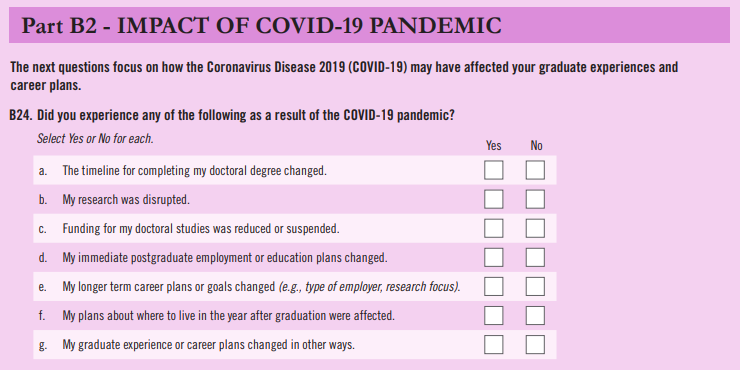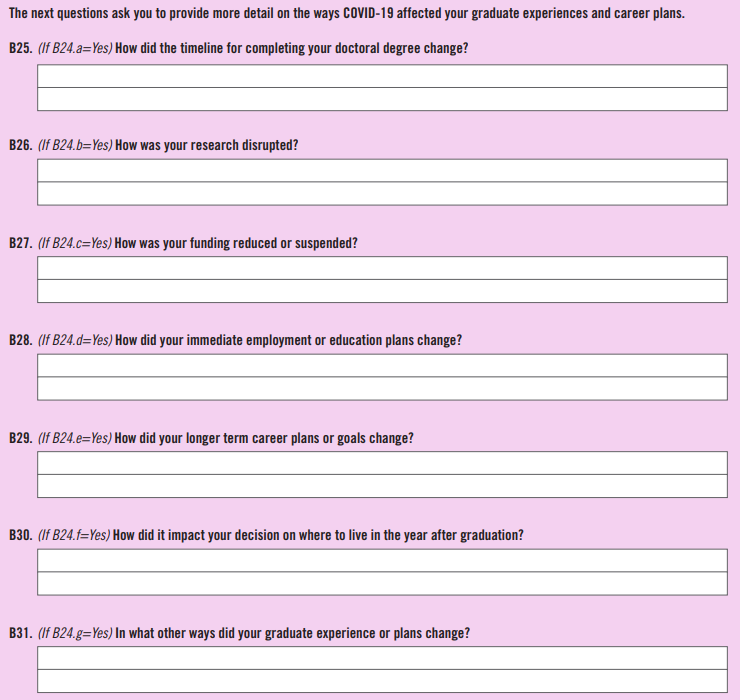Request for approval of a non-substantive change in the 2022 Survey of Earned Doctorates (SED)
2022 SED COVID Q OMB Memo 5.13.20211.docx
Survey of Earned Doctorates
Request for approval of a non-substantive change in the 2022 Survey of Earned Doctorates (SED)
OMB: 3145-0019
Memorandum
Date: May 12, 2021
To: Margo Schwab, Desk Officer
Office of Management and Budget
From: Emilda B. Rivers, Director
National Center for Science and Engineering Statistics
National Science Foundation
Via: Suzanne Plimpton, Reports Clearance Officer
National Science Foundation
Subject: Request for approval of a non-substantive change in the 2022 Survey of Earned Doctorates (SED)

The National Center for Science and Engineering Statistics (NCSES) requests approval for a non-substantive change in the 2022 Survey of Earned Doctorates (SED), OMB control number 3145-0019. Based on results from cognitive interviews, NCSES proposes changes to the questions that measure the impacts of the coronavirus pandemic on doctorate recipients’ graduate experience and career plans. This change will reduce cognitive burden by adding closed-ended questions, and removing some open-ended questions. It will also improve the quality of the data collected. NCSES expects these changes will have no substantial impact on the estimated respondent burden for the 2022 SED data collection cycle.
Background
The SED is an annual census survey of new recipients of research doctorates from U.S. institutions, sponsored by the National Science Foundation, the National Institutes of Health, the Department of Education, and the National Endowment for the Humanities. The SED collects educational history, education-related debt, financial support during graduate studies, information about postgraduation plans, and personal demographic information for each research doctorate recipient, primarily using the web survey mode with a small percentage of cases (approximately 2% of respondents) completing the survey by telephone.
The coronavirus pandemic has disrupted many aspects of higher education and the training of the next generation of the scientific and technical workforce. Shortly after the launch of the 2021 data collection cycle in May 2020, the SED added a new module of seven questions asking respondents how the coronavirus pandemic affected their graduate experiences and career plans. To maintain the applicability of the module and collect information on the lingering effects of the pandemic, NCSES conducted cognitive interviews to test improvements to these questions. That study was approved by OMB on December 20, 2020 under the NCSES generic clearance (OMB control number 3145-0174).
Proposed Change
The pandemic impact module of the 2021 SED instrument (Exhibit 1) contained seven items about the pandemic’s impacts on different aspects of respondents’ graduate experiences and career plans, followed by seven open-ended questions to collect details of such impacts from respondents. The original pandemic impact items worked as intended in the 2021 SED cycle. Respondents provided details about their situations when they said yes to experiencing an impact of the coronavirus pandemic on their graduate experience or career plans. Analyzing responses to the open-ended questions in the 2021 cycle allowed NCSES to identify common themes regarding the pandemic’s impact on each of the seven impact areas.
Based on that analysis, NCSES revised the pandemic impact module to include closed-ended response options in the follow-up questions to the pandemic impact items, except for three of the pandemic impact items (delay in degree completion, reduced funding for doctoral studies, and fluidity in postgraduation location), as the 2021 data showed that the open-ended responses to the follow-up questions in these three items did not provide any additional details to further our understanding of the pandemic’s impact on those aspects of graduate experiences and career plans.
These question and response option modifications were qualitatively tested with 60 doctoral students, using cognitive interviews conducted in February and March 2021. Results from the cognitive interviews verified that the revised questions were understood by participants and worked as intended. NCSES made small improvements to the tested questions based on these results, which are reflected in Exhibit 2.
Contact Person
Kelly Kang
Project Officer
Survey of Earned Doctorates
Human Resources Statistics Program
National Center for Science and Engineering Statistics
National Science Foundation
kkang@nsf.gov
703-292-7796
Exhibit 1. 2021 SED Pandemic Impact Module
|
|
|
Exhibit 2. 2022 SED Revised Pandemic Impact Module
The next questions focus on how the coronavirus pandemic may have affected your graduate experiences and career plans.
B24. Did you experience any of the following as a result of the coronavirus pandemic?
Select Yes or No for each
|
Yes |
No |
|
|
|
|
|
|
|
|
|
|
|
|
|
|
|
|
|
|
B25. (if B24.c=Yes) Previously, you said: “The pandemic affected my research.” How was your research affected as a result of the coronavirus pandemic?
Select Yes or No for each
|
Yes |
No |
|
|
|
|
|
|
|
|
|
B26. (if B24.d=Yes) Previously, you said: “The pandemic changed my immediate postgraduate employment plans.” How did your immediate postgraduate employment plans change as a result of the coronavirus pandemic?
Select Yes or No for each
|
Yes |
No |
|
|
|
|
|
|
|
|
|
B27. (if B24.e=Yes) Previously, you said: “The pandemic changed my longer term career plans.” How did your longer term career plans change as a result of the coronavirus pandemic?
Select Yes or No for each
|
Yes |
No |
|
|
|
|
|
|
|
|
|
Specify: ____________________________________________________________ |
|
|
B28. Did the coronavirus pandemic change your graduate experience or career plans in any other ways?
 1
Yes
1
Yes
 2
No
2
No
B28a. (if B28=Yes) In what other ways did your graduate experience or plans change as a result of the coronavirus pandemic?
Specify: _____________________________________________________________________
| File Type | application/vnd.openxmlformats-officedocument.wordprocessingml.document |
| Author | Gordon, Jonathan |
| File Modified | 0000-00-00 |
| File Created | 2021-05-14 |
© 2026 OMB.report | Privacy Policy

